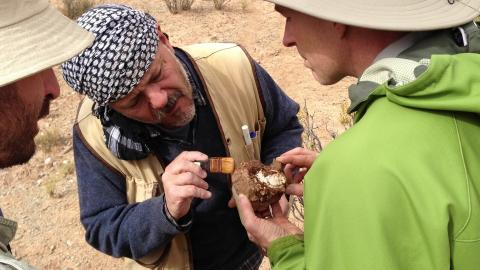Dr. Darin Croft studies the evolution of mammals over geologic time using living mammals and the fossil record. His research focuses on the mammals of South America, a continent with a rich fossil record that was geographically isolated for most of the past 66 million years. Thus, it is an excellent place to investigate topics such as adaptation, diversification, and community ecology. Fieldwork is an integral part of Dr. Croft’s research and he leads a long-term field project in Bolivia with active collaborations in Argentina, Chile, and Colombia. Dr. Croft’s research spans alpha taxonomy, systematics, paleobiology, paleoecology, and paleoenvironmental reconstruction.
Recent Publications
- Catena, A. & D.A. Croft. 2020. What are the best modern analogs for ancient South American mammal communities? Evidence from ecological diversity analysis (EDA). Palaeontologia Electronica 23(1):a03.
- Croft, D.A. & M. Lorente. 2021. No evidence for parallel evolution of cursorial limb adaptations among Neogene South American native ungulates (SANUs). PLOS ONE 16(8):e0256371.
- Croft, D.A., J.J. Flynn, A.R. Wyss, R. Charrier, & F. Anaya. 2021. New chinchillid rodents (Hystricognathi: Caviomorpha) from northern Chile and Bolivia fill a 17-million-year gap in the pan-chinchilline fossil record. Journal of Mammalian Evolution 28(4):1205–1236.
- Nelson, A., R.K. Engelman & D.A. Croft. 2023. How to weigh a fossil mammal? South American notoungulates as a case study for estimating body mass in other extinct clades. Journal of Mammal Evolution 30(3):773-809.
- Saylor, B.Z., A.M. Catena, D.I. Hembree, F. Anaya & D.A. Croft. 2022. Lithostratigraphy, chronostratigraphy, and sedimentary environments of the Middle Miocene Quebrada Honda Basin in southern Bolivia and implications for Andean climate and uplift. Palaeogeography, Palaeoclimatology, Palaeoecology 601:111135.


